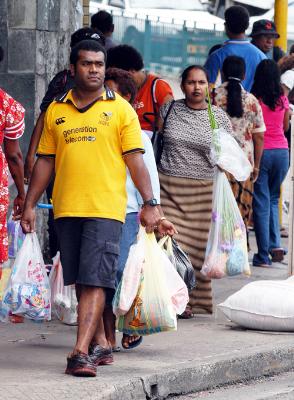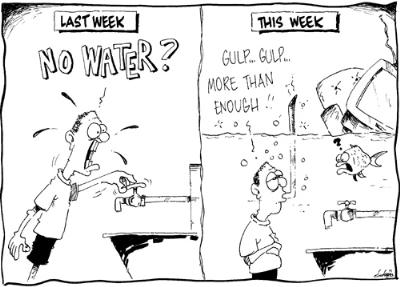
Interesting Letter to Fiji Times Editor.
Power of landowners
WE see much written in the press about the power of the landowner when they block development or take extreme action.
I have first-hand experience in my family about how powerless landowners are unless they are prepared to take direct action.
A couple have moved on to a piece of reserve land where my family have lived and farmed for 50 years. They are Fijian but from another province. They have no right to live on our reserve. They claim to have a lease but according to the NLTB it is not the case.
They have cleared the land and are planting. They have polluted the water in which my family use to drink and bath. They have threatened women members of my family.
The police have been called but merely told us to keep the peace. I am told that the court has no jurisdiction here. The NLTB said it is reserved land and no lease has been issued but does nothing to enforce it.
What recourse has my family in this situation? We have no wish to resort to direct action but who else will enforce the law?
What recourse have we against these trespassers who steal our land and foul our water?
Doctor FS Dewa
Suva
Club Em Designs

Stuck in Fiji Mud would like to share excerpts of a new book, from a former Legal officer for the Fiji Government.
SPEAKING OUT
Excerpts:
“While those who lusted for undeserved power, and their many misguided followers, were embarked upon a malignant enterprise against their homeland and its leaders, most successors to ancient warriors and the ethically naked but finely attired retailers of divine wisdom sank deeper into the ashes of their own vice”
“…the merchants of malice continue to ply their wicked trade at every opportunity by maligning a whole race that is innocent of any wrongdoing against Fijian custom, tradition or their land”
“Instead of celebrating the richness of our diverse cultures, our distinguishing features became cruel dividing walls to keep us apart in ministering to the affairs of our common home.”
“The marchers claimed to express their extreme disapproval that the Prime Minister is an Indo-Fijian … one may well ask how they reconcile their repugnant racist sentiment on the weekday with their purported devotion to the Biblical precept of the brotherhood of Man on Sunday.”
“The forebears of the Punjas, Motibhais, Vinod Patels and other large businesses took several generations to reach their present elevated state and a great deal of self-denial and self-exploitation was involved along the way. There is no short cut to success_ -for Fijians and others alike.”
“A soufflé doesn’t rise twice; neither will the National Bank.”
“Why are Indo-Fijians supposed to be good at managing businesses but are not to be allowed to manage the biggest business of all; the government of the country? Why? Oh why?”
“Might we not lose more judges who find the CJ's modus operandi unacceptable, as shown up in Judge Anthony Gates's ruling last week in a matter when Sir Timoci tried to have a case in which he is a defendant assigned to a judge of his selection?”
“And lastly, if, after a day of rest, one should feel energised for recreation of an amorous kind, he or she must heed the cautionary chorus: ‘Never on a Sunday’.”

SPEAKING OUT
Sir Vijay R Singh
“I would rather die for speaking out than to live and be silent.”
Fan Zhongyan 988-1052
ABOUT THE AUTHOR
In this anthology of articles that he wrote for various publications during the decade of 1995 – 2005, Sir Vijay R Singh demonstrates a rare ability to say boldly and eloquently what was happening behind the scenes, below the surface, and beyond the obvious.
Born into a poor sugarcane farming family in Ba, he has maintained a life-long empathy for farmers and workers, regardless of the many successes he was to later achieve. That explains his presidency of the Fiji Kisan Sangh for two decades and his appointment as the first Chief Executive of the newly established Sugar Cane Growers Council in 1985.
Sir Vijay read law in London and entered private practice in Fiji in 1954.
He was elected to the Legislative Council in 1959 on personal merits (no party politics then), and, six years later, teamed Ratu Sir Kamisese Mara to form The Alliance – a political party whose fundamental ideology was to bridge the racial divide working together for the common good of all. He was president of the Indian Alliance from its founding in 1969 until he became the Speaker of the House in 1975.
Sir Vijay was one of the brightest stars in Ratu Sir Kamisese Mara’s Cabinet, and during an illustrious career in public life he chalked up a formidable array of achievements in politics, law and community service.
Parliament lost one of its most effective and eloquent parliamentary performers when, in the mid-1970s, Sir Vijay was elected Speaker, a post that was excellent preparation for the presidency of the Governing Council of the United Nations Development Programme (UNDP) in New York, to which he was elected in 1979.
Sir Vijay was knighted in 1976, the first Indo-Fijian so honoured.
In this compendium of critical essays, he focuses on events and issues that have had a momentous impact on life in Fiji over the past two decades. As one who has been at the centre of power, he brings rare insight into the functioning of government apparatus. His style is lucid and elegant, incisive and intellectually stimulating.
Much of what he said years ago is as relevant today as it was then. For everyone interested in Fiji, this is a ‘must read’ book.

ACKNOWLEDGEMENTS
The idea of this book developed as a substitute – at least for the time being - for the memoirs that some friends and well-wishers had urged me to write, particularly Dr Satendra Nandan, Vijendra Kumar, Dr. Brij Lal and my wife.
For the moment, an autobiography seems like too hard an undertaking but I hope that this book will give a glimpse, incomplete and hazy though it might be, of my life and times.
I am grateful to Dionisia Tabureci of Island Business, Suva, for her efforts in retrieving the essays published in that magazine in 1996 from its archives.
I am particularly appreciative of the invaluable assistance of Vijendra Kumar, former editor of the Fiji Times and now resident of Brisbane, Australia, in editing the essays, and his advice and assistance in other ways. I also thank Praveen Chandra of Brisbane for his technical expertise in making the manuscript ready for the printers.
I acknowledge my debt to my parents and to my uncle Hari Shankar who together laid the foundations for the person I became; and to the many political colleagues and personal friends -- many of whom have long since departed – for helping to mould my role and influence in public affairs.
I wish to thank those who responded to my articles at the time of their publication; I have quoted some of them as footnotes to the relevant article.
And lastly, an acknowledgement of another kind. I had long admired the Chief Justice Sir Timoci Tuivaga for his many fine personal qualities and his courageous commitment to principles after the 1987 coups. To write adversely of his conduct after the events of May 19, 2000 was a painful experience, but a task I felt I could not evade.
Vijay R Singh
Brisbane, Australia
E-mail address:sirvijay@bigpond.net.au

THE SKYLARK WILL SING
AS I PONDER every week on what next to write about the condition of Fiji and future prospects of its more vulnerable sections, particularly of the Fiji-Indians, I am driven to the realisation that much that is relevant to my efforts has been said before. In an address to Alliance members and ministers as we approached independence in 1970, I had quoted from Nobel Laureate Rabindra Nath Tagore’s poem Gitanjali to express my vision of the future:
"Where the mind is without fear and the head is held high, Where knowledge is free,
Where the world has not been broken up into fragments
By narrow domestic wall,
Where words come out from the dept of truth,
Where tireless striving stretches its arms towards perfection,
Where the clear stream of reason has not lost its way
Into the dreary desert sand of dead habit,
Where the mind is led forward by Thee
Into ever widening thought and action
Into that heaven of freedom, my Father, let my country awake."
And some years later His Holiness Pope John visited us and declared, "Fiji: The Way the World Should Be."
We seemed to be getting there, for sure.
But in 1987, and more grievously in May 2000, the prejudice against Indo-Fijians combined with passion for power on the part of some moved them to commit treason and to hold prisoner not only their Government but their humanity, reason and religion, as well.
On each occasion, most customary and chosen leaders purported to have been unaware of their people's aspirations and disposition until the coup makers told them so; whereupon they readily agreed to the “cause” and gave earnest encouragement to evil deeds.
But in so doing, they ignored the wise counsel of Khalil Gibran:
"Your reason and your passion are the rudder and the sails of your seafaring soul.
If either your sails or your rudder be broken, you can but toss and drift,
Or else be held at standstill in mid seas.
For reason, ruling alone is a force confining.
And passion, unattended, is a flame that burns its own destruction.
Therefore, let your soul exalt your reason to the height of passion,
That it may sing:
And let it direct your passion with reason
That your passion may live through its own daily resurrection
And, like the phoenix, rise above its own ashes."
While those who lusted for undeserved power -and their many misguided masters and followers --were embarked upon a malignant enterprise against their homeland and its chosen leaders by holding government parliamentarians hostage, most successors to ancient warrior-chiefs and the ethically naked but finely attired retailers of divine wisdom, sank deeper into the swamp of their own vices.
These men of the cloth sought reflected glory in glorifying the inhumanity of their sinful flock of hostage takers; but in their uncompassionate hearts, could not find the will to spare a moment to cast a comforting glance at the hapless and innocent hostages who languished but a few yards away in the parliamentary complex.
They joined together to desecrate the national motto: Fear God and Honour the Chief; they violated the solemn promise. And their political outriders, far and wide, high and low, military and civilian, hastened to proclaim their support for the newly invented “cause” as defined by army officer Sitiveni Rabuka (1987) and failed businessman George Speight (2000), while occasionally proclaiming not to support the means, but had not the courage to condemn and resist their evil enterprise.
Some enacted the charade of seeking forgiveness of their victims, claiming that this was their custom and tradition, but without showing a semblance of remorse for their wicked ways.
Such pretence of piety will not heal the trauma of the hostages and their loved ones for their 56-day stopover into hell. Or wash away the tears of Filipo Seavula's young wife, suddenly made widow in a violent act of treason, or her young orphaned son, or diminish the daily agony of parents, suddenly made jobless, as they strive to feed their hungry children.
Some of the victims may, in a show of simulated or genuine generosity of spirit, feign forgiveness.
As for me,
"I am no Homer's Hero, you all know,
I profess not Generosity to a Foe.
My Generosity is to my Friends,
That for their Friendship I may make amends.
The Generous to Enemies promotes their ends,
And becomes the Enemy, and Betrayer of his Friends."
Because, as Martin Luther King Jr said:
"I am coming to feel that the people of ill will have used time much more effectively than the people of goodwill".
Undeserved forgiveness is unforgivable encouragement of evil.
But all who gloat at the triumph of lawlessness and its perceived prizes might do well to heed Bob Dylan's 1963 lyrics in his Song for the Rocks in the Stream:
"The line it is drawn; the curse it is cast
The slow one now will later be fast
As the present now will later be past
The old order is rapidly fading
And the first one now will later be last
For the times, they are a-changing."
The already sidelined and discriminated and soon to be displaced Indo-Fijians now know that their ethnic Fijian friends and neighbours, "they are a-changing, and the line is drawn and the curse is cast."
But however distressed and disillusioned, the Indians will behave as they always have -- with the same patience, fortitude and indomitable spirit that their forefathers showed in the long night of the Girmit' -- "With a mind without fear and head held high."
Dr. Subramaniam rightly said: "You may make us second class citizens but you cannot make us second class people." Or, as Khalil Gibran had said with touching eloquence:
"You can muffle the drum, You can loosen the strings of the lyre,
But who shall command the skylark Not to sing."
And so, I must, like the skylark, continue to sing, and serve by Speaking Out.
THE MICKEY ROONEY SYNDROME
April 1999.
WE LIVE IN extraordinarily interesting times. History and reputations are being made, revised and unmade.
Labour/FA/Panu, after adopting a common manifesto, have fielded seemingly competing candidates. Mahendra Chaudhry, the skilful tactician, hasn't explained whether this signifies disagreement or manipulation of the preferential voting system to keep hoped for victory within the family.
More intriguing is SVT/NFP/GUP coalition. It is firmly united in its determination to win, and little else. A manifesto should have glued them together but they couldn't agree on one. As it is, Rabuka, Reddy and Pickering have separate route maps to the Promised Land. Their kinship, is therefore, based not on common outlook but on common adversaries.
Aided by international experts at thought manipulation, NFP denigrates its former friend turned nemesis Mahendra Chaudhry for giving Labour's spare preferences to VLV, the dreaded Christians. They might ban golf, gardening and much else on Sundays.
NFP politely overlooks that its ally SVT has given its preferences to Butadroka's party, the one that wants Indo-Fijians deported, and, for good measure, to VLV, as well. (Fiji Times 30/4/99 pp 7/13).
Rather than giving security of tenure to NLTB tenants, Rabuka has already moved a Bill in parliament to give to NLTB several hundred thousand acres of publicly owned (Crown) land settled by several thousand tenants, mostly Indo-Fijians. And crown land tenants had thought they had absolute security of tenure.
Also very odd is the fact that, after allocating open seats among themselves, the SVT/NFP/GUP are running separate candidates, just like the Peoples Coalition. But oddities of manipulation have descended to the bizarre. SVT has urged voters to vote below the line and prefer its candidate Sovea Tabua to NFP’s James Raman. SVT's formal preference for Raman is thereby cancelled. (see ad. DP 1/5/99 p11)
Some folks can't leave a good thing alone. Neophyte politician Dr Wadan Narsey dusted up NFPs ancient logic that only an exclusively racial electorate could elect its representative, notwithstanding the conflict between this contrived criterion and its advocacy of common roll.
More extraordinary was Jai Ram Reddy's endorsement of Dr. Narsey and his cruel dismissal of NFP's many former friends as “token” representatives of their communities: Ratu Julian Toganivalu, Apisai Tora, Ratu Mosese Tuisawau, Rev Peter Davis, Joeli Kalou, Ratu S Katonivere, Arthur Jennings, Koresi Matatolu, Ratu Osea Gavidi, Edmund March, Ratu Napolioni Dawai, Dr Timoci Bavadra, Dr Tupeni Baba, Jo Nacola and others.
Reddy says they were all fakes; brass; not the genuine 24-carat gold that Rabuka and Pickering are. In so doing, Reddy validated Rabuka's excuse for the coup on the ground that Bavadra's NFP/Labour coalition government was Indian-dominated. An argument that Reddy had consistently refuted for 10 years by pointing out that Bavadra's cabinet had equal numbers of Indians and Fijians and a general elector, too. Reddy's dismissal of his former leader and colleagues as merely “token” representatives of their people belatedly confirms his new leader's old excuse.
But Rabuka was also was revising history. No sooner had Reddy endorsed his old reason for the coup, Rabuka had come up with a new one -- that he had been “used” and “manipulated” by others to do their bidding, that the old excuse wasn't valid any more.
According to NFP's ancient and recently reconfirmed doctrine that only a communal electorate is capable of selecting its genuine representatives, both Reddy and Rabuka will now be “token” representatives, not the authentic stuff they were, as they are candidates for multiracial, and not communal, constituencies.
While Dr Narsey was needlessly belittling “ghost” and “token” leaders of another era, his present leader had such a “ghost”, “token” and “honoured” leader arrive from Australia (former Indian Alliance MP Kishore Govind OBE) to lend NFP a helping hand in Ba, the “ghost's” former stronghold.
Weird also is the unique spectacle of the certified coup leader urging people to vote freely, while his former victim reminds them of the coup, strife in Bosnia, Kosovo and Northern Ireland, thus intending to induce electors against voting freely and fearlessly.
A most disturbing aspect of democracy in practice, all this.
NFP says that its 30-year old policy of confrontational politics was wrong. Wrong too, it says, was its befriending of “token” Fijian and General voter representatives, the likes of those mentioned above.
That it should have been, by its own admission, wrong for so long about so many things and so many people gives the public little comfort that NFP is right this time in its judgments about its latest friends, Rabuka and Pickering.
NFP's claim that Rabuka and Pickering lead “mainstream” parties is certainly of uncertain force. Even the dim-eyed can see that battalions of Fijian chiefs and commoners alike are opposed to Rabuka's SVT. Indeed, never in history has a mainstream Fijian party enjoyed such diversely talented and extensively organised opposition.
As for Pickering's United General Party, even the blind can see that it is anything but united. Indeed, the Generals have more dissident groups than they have seats, which is a record of some kind.
Film actor Mickey Rooney -- like the NFP -- had always declared his love of the moment to be the answer for his everlasting bliss. Sadly, his repeated misjudgments led to 11 divorces, handily outstripping the much married and divorced Elizabeth Taylor's record.
Obvious truths and history give rise to a compelling thought -- might not the error-prone NFP be wrong again in its present passion for Rabuka and Pickering and aversion to Mahendra Chaudhry and others?
Might it be that NFP suffers from the Mickey Rooney syndrome?
---------------------------
Dr Wadan Narsey responded to the above article in Fiji Times’ open column.
Benefits of Coalition
[...Your columnist Sir Vijay Singh interprets the words “token Fijian leaders” as an insulting reference to leaders who were Fijians. That was not the intention in my original advertisement, in my use of the word “token”.
I am fully aware and acknowledge the enormous contributions made by indigenous Fijians such as Ratu Julian Toganivalu, Dr Bavadra and many other Fijian leaders, who had the courage to work with the Indian community.
But Sir Vijay knows (even if he ignores) that I was merely pointing out that the indigenous Fijian community did not see them as “Fijian leaders”. They were seen as Fijians who were sympathetic to Indians, and voted in on the basis of Indian votes, but without widespread Fijian support.]
Sir Vijay would seem to argue that just because some Fijians are elected “democratically” they should be treated as “Fijian leaders.” Unfortunately, in the real world, Fijians and their real leaders in 1987 did not think so, whatever may have been the commitment of the Bavadra government to Fijians.
It is puzzling that Sir Vijay still refuses to acknowledge the strengths and benefits of the SVT/NFP co-operation and coalition. Sir Vijay chooses to ignore the historical fact that whatever may have been the faults of the SVT government and their [sic] leader, they have revised the constitution to make it fair and genuinely democratic.
Not only that, but the new constitution also gives guarantees of fair representation of both Indian and Fijian political representatives in cabinet. It is disappointing that Sir Vijay refuses to acknowledge that Mr Jai Ram Reddy and the NFP are in coalition with Mr Rebuke and the SVT because they want to work together with the largest Fijian party and its leader. Does it matter how long it took to realize this lesson?
It is more disappointing given that Sir Vijay himself for more than 30 years , chose to work closely with Ratu Mara \, the Alliance party and the Fijian community, and is surely well aware of he benefits of such co-operation.
My reference to “political ghosts” was not meant to belittle Sir Vijay, but merely to point out a connection the politics of the past era.
Many people are wondering whether his acid attacks on NFP (Reddy) and SVT (Rabuka) are fair and balanced comments. Or is Sir Vijay providing assistance to some current opponents of NFP and SVT who just happen (coincidence?) to be relatives of old Alliance friends of Sir Vijay?
As an economist, who is continuously berated by his colleagues for not being a politician, I take it as a compliment to be called a “neophyte optician” by Sir Vijay Singh
Dr Wadan Narsey.” ...]
I replied as follows:
“I am glad to accept Dr Wadan Narsey’s explanation that he didn’t intend to insult anyone when he referred to “token” leaders not elected exclusively by voters of their own race.
But then how do I interpret Dr Narsey’s innuendo that my observations are not objective but are “assistance to some current opponents of NFP and SVT who just happen (coincidence?) to be relatives of the old Alliance friends of Sir Vijay”?
It just so happens that most of friends of the Alliance days are supporters of the NFP. Mr Y P Reddy, a valued ally of those days, is indeed the chairman of the NFP selection committee. Dijendra Singh of Ba, ally, friend and a relation is campaigning for the NFP, including Mr Reddy in Nadi. Diwan Shankar, my first cousin, is the NFP candidate against Mahendra Chaudhry. Old Alliance friends like Maan Singh and Azam Khalil are also NFP candidates, as is Dhirendra Kumar of Ra whose father was my ardent political supporter.
I respect their right to follow their judgment and have not sought to influence any one of them to change their affiliation.
It is unbecoming of Dr Narsey to suggest that my views are tailored to suit some unknown relatives of some unnamed old friend of whose identity I have not the slightest idea.
His accusation of bias has less substance than soup made out of the shadow of a chicken that died of starvation.
Sir Vijay R. Singh”
A DIMINISHED JUDICIARY
17 October 2000
DESPITE THE CHIEF JUSTICE Sir Timoci Tuivaga's explanations, judges, lawyers and lay persons at home and abroad remain profoundly perturbed at his enthusiastic engagement in politically charged extra-judicial business.
Judicial independence is far too important a public interest issue not to be publicly discussed when the occasion demands, lest silence induced by tact or timidity be misconstrued as acceptance of the unacceptable. A judge who strays beyond his judicial functions cannot escape public scrutiny and criticisms of his extra-judicial activities.
In 1987, all superior court judges had courageously demonstrated their commitment to uphold the constitution and the rule of law and endured harassment of all kinds. Judge Kishore Govind was imprisoned at Naboro and Judge Rooney held under house arrest for days. All eventually resigned rather than serve under a military regime. Sir Timoci Tuivaga CJ was one such judge but although he was later recalled to the bench, we lost most of the others for good. They deservedly stood high in universal pubic esteem.
But sadly, the CJ's recent conduct has caused much dismay. Sir Timoci advised the President on the Constitution's provisions that he could invoke to dismiss the Coalition government. The President acted accordingly.
At issue is not the correctness of the advice -- although that, too, is highly questionable -- but the propriety of judges acting at all as the President's legal counsel. The entirety of the legal profession in the public and private sector, and talent abroad, was available to the President.
The severely denounced decision of Australian Chief Justice Garfield Barwick to advise Governor General John Kerr how to dismiss Prime Minister Gough Whitlam in 1975 should have been a salutary signal to any judge not to follow a disreputable precedent. But the Chief Justice did just that, and he cannot evade the consequential commotion.
An even graver grievance concerns the CJ's drafting of a decree for the military to promulgate that purported to re-establish the judiciary, and in the process, also to abolish the Supreme Court. This was far from being a benevolent involvement, as Sir Timoci would like us to believe, because implicit in his drafting of the decree were hazardous assumptions of great constitutional and political significance.
Firstly, that the military had at that point in time acquired the authority in law to rule by decree, and secondly and accordingly, the judiciary and the constitution from which it drew its authority, went out the window together when the military claimed to have 'wholly removed' the constitution.
Also, for about a hundred years the Privy Council in London had been our final court of appeal and, after the establishment of the Fiji Court of Appeal, the highest of our three superior courts structure. Until, of course, a lieutenant colonel deposed the Queen in 1987 and thereby severed our access to Her Majesty's Privy Council.
To fill the void, the Supreme Court of Fiji was created but the decree Sir Timoci helpfully draft abolished the that Court. Neither the military nor the CJ has claimed paternity of this eccentricity -- that amputation of the highest of our courts was essential surgery to successfully address our afflictions, the foremost of which then were the safe release of the hostages and the restoration of law and order.
The military, for its part, sought to distance itself from this most peculiar prescription for the treatment of our ills. It published a statement two days after the decree, assuring all that "the judiciary has not been tampered with" (Sunday Times 11 June p.25).
Weighty questions inevitably arise. Did the military make the incorrect statement because it did not know that the CJ drafted decree had in fact abolished the Supreme Court? And that thereupon Lord Cooke, Sir Gerard Brennan, Sir Moti Tikaram, Sir Keith (correction Anthony) Mason and Mr Justice Toohey had been summarily dismissed? Also, that the CJ had installed himself as a judge of the Court of Appeal?
The military's unawareness of these and other aspects of the decree may explain its incorrect statement, but that excuse will inevitably transport the CJ to even a lower and more perilous perch. Was he less than frank with Commodore Frank Bainimarama and kept him in the dark of the decree's important provisions?
Whose agenda required the Supreme Court's abolition -- the military's or Sir Timoci's opposition to the Court, and why? If the military's, why did the CJ not seek the Law Society's support to preserve the long established judicial system, instead of completely ignoring the legal profession while he collaborated with the military?
Did Sir Timoci's adventures cause or contribute to the resignations of Justices Jai Ram Reddy as President of the Court of Appeal and Ratu Jone Madraiwiwi as a High Court judge? And might we not lose more judges who find the CJ's modus operandi unacceptable, as shown up in Judge Anthony Gates's ruling last week in a matter when Sir Timoci tried to have a case in which he is a defendant assigned to a judge of his selection?
And crucially, what, in Sir Timoci's view, is the source of his present claim to be the Chief Justice? Is it the Constitution that he was sworn to uphold, or the military decree that he obligingly drafted to restore his and other judicial offices? The two propositions are mutually exclusive; they cannot reside under the same roof at the same time. Sir Timoci cannot escape these and other disquieting questions -- all products of his questionable conduct in office.
In his typically understated fashion, Peter Knight, then Law Society President, had observed: "The Chief Justice had other options open to him." Expediency, arbitrary decision-making, acting as the executive's legal counsel and the military's legal draftsman were not in Mr Knight's contemplation.
The Judiciary stands much diminished; thanks to the Chief Justice and some of his colleagues.


No comments:
Post a Comment